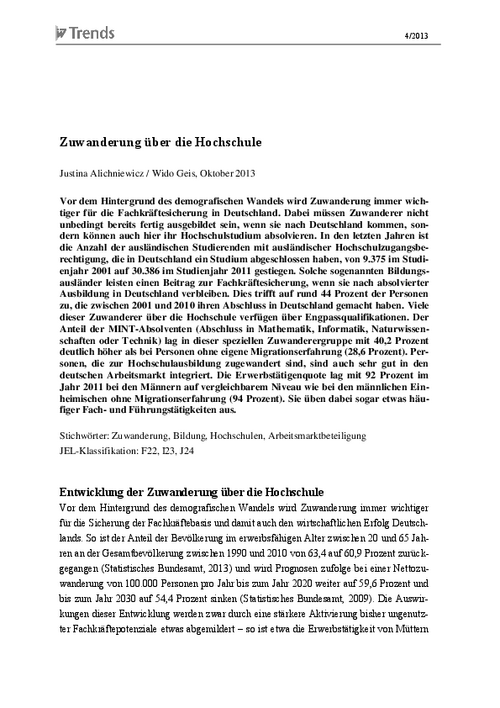Please switch to a modern browser (e.g. Google Chrome, Firefox or Microsoft Edge) in order to enjoy the best user experience.

Teamleader Project Make it in Germany
Tel: +49 221 4981-875 Mail: godesberg@iwkoeln.de Justina GodesbergResearch unit
(in cooperation with Wido Geis, Michaelle Nintcheu)
Willkommenskultur – Wie Deutschland für ausländische Fachkräfte attraktiver werden kann
IW-Positionen – Beitrage zur Ordnungspolitik Nr. 65, Köln 2014
(in cooperation with Wido Geis)
Immigration via Tertiary Education
IW-Trends 4/2013
(in cooperation with Jeannette Michaelle Nintcheu)
Potenziale der Zuwanderung für Unternehmen und betriebliche Willkommenskultur
Handbuch der Aus- und Weiterbildung, Februar 2015, Fundstelle 4268

In view of Germany’s ageing population, immigration is steadily gaining in importance as a means of securing the supply of skilled workers. However, it is not necessary for immigrants to fully qualify before coming to Germany: they can obtain their university degree here. Between the academic years 2001 and 2011 the number of foreign students who had completed their high school education abroad but obtained a tertiary qualification in Germany rose from 9,375 to 30,386. These education-seeking foreigners contribute to the supply of skilled workers if they remain in Germany after completing their courses. This was the case for about 44 per cent of those who graduated in Germany between 2001 and 2010. Many of those who immigrate via tertiary education have qualifications which are in short supply. At 40.2 per cent the proportion of STEM (Science, Technology, Engineering and Mathematics) graduates in this specific category of immigrants was considerably higher than amongst those without a migration background (28.6 per cent). Those who have moved to Germany with the aim of obtaining a university degree are also well integrated in the German labour market. At 92 per cent and 94 per cent respectively the employment rate for men in 2011 was comparable with that of native males. Indeed, a slightly higher proportion were employed in specialist or management positions.
IW